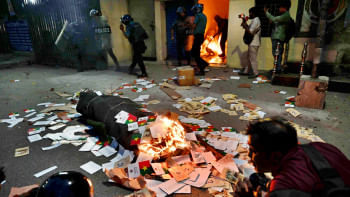SC opinion on 5 appeal points
The Appellate Division of the Supreme Court yesterday issued a "short order" with its opinions on all five points pressed by appellants in the Bangabandhu killing case. In one observation, the court said it was not a case of criminal conspiracy to commit mutiny, but a criminal conspiracy to murder Bangabandhu and other members of his family.
Convicts say:
Judges of the High Court Division Bench have signed two separate dissenting opinions. The third judge has committed a fundamental error of law by not considering the reference for all the convicts and by considering the cases of only six.
Appellate Division says:
It is for the third judge to decide on what points he will hear arguments, if any. He is completely free in resolving the difference as he thinks fit. The third judge was competent to decide the case of six convicts of whom the judges were equally divided in their opinion. And the third judge was in agreement with the decision by the judges of the High Court Division Bench on nine convicts of whom there was no difference of opinion.
Convicts say:
There was an inordinate delay of 21 years in lodging the first information report (FIR). This unreasonable delay speaks of ill intention and design by the prosecution to falsely implicate the appellants by introducing a concocted story. The High Court here erred in law in maintaining the capital sentence without properly considering this part of the matter.
Appellate Division says:
The sessions judge and the judges of the High Court have delivered the explanations given by the prosecution on the delay after assessing evidence. This finding being a concurrent finding of fact does not call for any interference.
Convicts say:
Evidence discloses a case of mutiny leading to the murder of the then president and his family members. As it is not a murder simpliciter (simple murder case), the handling of the case by a normal criminal court has vitiated the trial.
Appellate Division says:
An offence of murder can be tried under the Army Act 1952 if the offender commits the offence in 'active service'. But the appellants were not in 'active service' under the Army Act. Their trial by an ordinary criminal court is not barred by the provisions of the Army Act.
Convicts say:
Evidence does not disclose a case of a criminal conspiracy to commit murder but a case of conspiracy to commit mutiny to change the then Mujib government. This is the reason why the conviction and sentence are illegal.
Appellate Division says:
There is no legal evidence on record to conclude that Bangabandhu Sheikh Mujibur Rahman and other members of his family were murdered as a consequence of mutiny. We view that it is not a case of criminal conspiracy to commit mutiny, but a criminal conspiracy to murder Bangabandhu and other members of his family.
Convicts say:
As the prosecution has failed to prove the charge under the Penal Code against the appellants by properly evaluating and sifting evidence, there has been a serious miscarriage of justice.
Appellate Division says:
The High Court judges believed that the prosecution had been able to prove beyond reasonable doubt the charge of murder against the appellants and other convicts with reliable evidence.
Also, the appellants failed to make out a case that the High Court had caused a grave substantial injustice or a miscarriage of justice. And we find no cogent ground to interfere with the judgment and order of the High Court.
As the appellants have failed to make out a case of extenuating circumstance to commute their sentence of death, we are not inclined to interfere with the sentence of death awarded to the appellants by the sessions judge and maintained by the High Court.

 For all latest news, follow The Daily Star's Google News channel.
For all latest news, follow The Daily Star's Google News channel. 



Comments